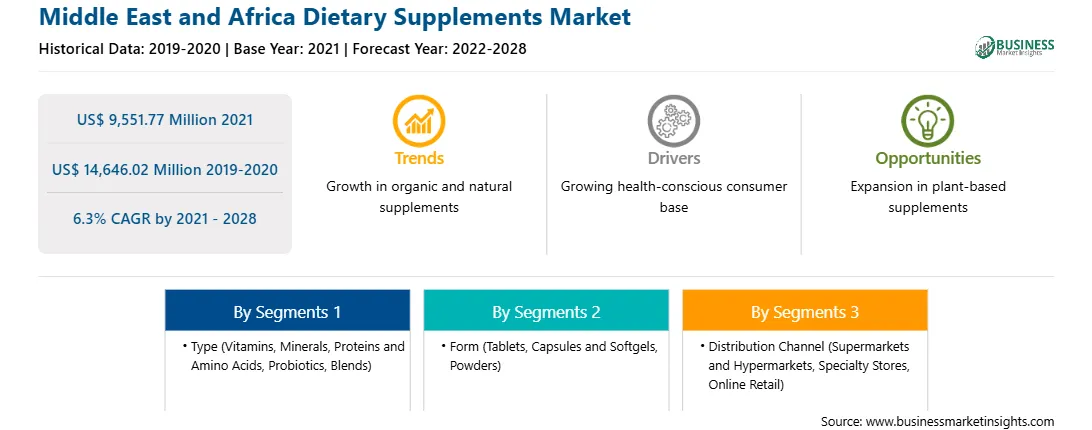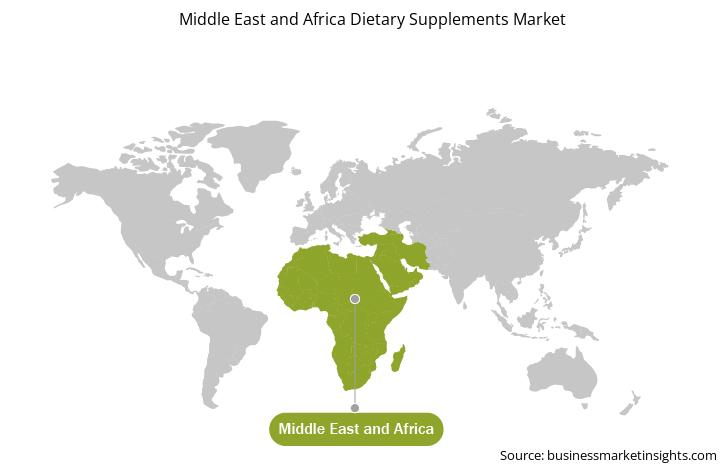Market Introduction
The Middle East & Africa (MEA) region includes countries such as South Africa, Saudi Arabia, the UAE, and the Rest of MEA. In the MEA region, the rising obesity rates have become a major public health concern, along with the subsequent increase in obesity-related co-morbidities. Malnutrition rates are particularly high in the region. The prevalence of overweight and obesity in the MEA ranges from 74% to 86% in women and 69% to 77% in men, according to the WHO Regional Office for the Eastern Mediterranean. The various types of dietary risks raise the chances of getting a disease. Hence, nowadays, many people from the region are focusing on following healthy eating patterns, thereby boosting the demand for dietary supplements. Further, for the past few years, the Middle East and Africa region has had a moderate increase in consumer healthcare product sales, which is likely to continue and develop. The rise in consumer health care products is a strong indicator that individuals are becoming more concerned about their well-being by supplying their bodies with proper nutrition. The majority of consumers in the region are looking for products that enhance immunity, such as those that reduce the risk of catching a cold or flu. Due to the high frequency of illness outbreaks in Africa, people are gradually adopting preventative healthcare methods such as dietary supplements. Accentuating preference for plant-based dietary supplements and growing product innovation are the major factor driving the growth of the MEA dietary supplements market. However, presence of counterfeit products hinders the growth of MEA dietary supplements market.
In the MEA region, Turkey, South Africa, Iraq, and Israel are among the major countries with a high number of COVID-19 confirmed cases and deaths. According to the International Finance Corporation, the COVID-19 pandemic has a severe impact on the economy of the MEA which has led to declining oil production, tourism, and remittances. The quarantine measures implemented for sanitary purposes in the region have led to a standstill of several activities across diverse economic sectors. The MEA region comprises many growing economies, which are prospective markets for dietary supplements vendors. The pandemic has significantly increased the growth of the dietary supplements market in the region due to various health benefits associated with it and it also helps in improving the immune system against COVID-19.
Strategic insights for the Middle East and Africa Dietary Supplements provides data-driven analysis of the industry landscape, including current trends, key players, and regional nuances. These insights offer actionable recommendations, enabling readers to differentiate themselves from competitors by identifying untapped segments or developing unique value propositions. Leveraging data analytics, these insights help industry players anticipate the market shifts, whether investors, manufacturers, or other stakeholders. A future-oriented perspective is essential, helping stakeholders anticipate market shifts and position themselves for long-term success in this dynamic region. Ultimately, effective strategic insights empower readers to make informed decisions that drive profitability and achieve their business objectives within the market. The geographic scope of the Middle East and Africa Dietary Supplements refers to the specific areas in which a business operates and competes. Understanding local distinctions, such as diverse consumer preferences (e.g., demand for specific plug types or battery backup durations), varying economic conditions, and regulatory environments, is crucial for tailoring strategies to specific markets. Businesses can expand their reach by identifying underserved areas or adapting their offerings to meet local demands. A clear market focus allows for more effective resource allocation, targeted marketing campaigns, and better positioning against local competitors, ultimately driving growth in those targeted areas.Middle East and Africa Dietary Supplements Strategic Insights

Middle East and Africa Dietary Supplements Report Scope
Report Attribute
Details
Market size in 2021
US$ 9,551.77 Million
Market Size by 2028
US$ 14,646.02 Million
Global CAGR (2021 - 2028)
6.3%
Historical Data
2019-2020
Forecast period
2022-2028
Segments Covered
By Type
By Form
By Distribution Channel
Regions and Countries Covered
Middle East and Africa
Market leaders and key company profiles
Middle East and Africa Dietary Supplements Regional Insights

Market Overview and Dynamics
The MEA dietary supplements market is expected to grow from US$ 9,551.77 million in 2021 to US$ 14,646.02 million by 2028; it is estimated to grow at a CAGR of 6.3% from 2021 to 2028. The increasing geriatric population improved medical facilities, rising obesity cases, and the surge in the number of the insured people have resulted in an upswing in healthcare expenditure. According to the United Nations, in 2019, millions of people were aged 65 and up across the region. The number of elderly people is expected to increase to 1.5 billion by 2050. The proportion of individuals aged 65 and up, climbed from 6% in 1990 to 9% in 2019. Due to this rise, the spending in the healthcare sector has increased. This ongoing rise in healthcare expenditure has enforced people to look for health supplements to keep themselves fit and fine, creating new opportunities for dietary supplements across the MEA region.
Key Market Segments
In terms of type, the vitamins segment accounted for the largest share of the MEA dietary supplements market in 2020. In terms of form, the capsules and softgels segment held a larger market share of the MEA dietary supplements market in 2020. Further, the specialty stores segment held a larger share of the MEA dietary supplements market based on distribution channel in 2020.
Major Sources and Companies Listed
A few major primary and secondary sources referred to for preparing this report on the MEA dietary supplements market are company websites, annual reports, financial reports, national government documents, and statistical database, among others. Major companies listed in the report are Abbott; Amway Corp.; Bayer AG; Bionova; GlaxoSmithKline plc.; Otsuka Holdings Co., Ltd; Pfizer Inc.; and The Bountiful Company among others.
Reasons to buy report
MEA Dietary Supplements Market Segmentation
MEA Dietary Supplements Market - By Type
MEA Dietary Supplements Market -
By Form
MEA Dietary Supplements Market -
By Distribution Channel
MEA Dietary Supplements Market - By Country
MEA Dietary Supplements Market - Company Profiles
The Middle East and Africa Dietary Supplements Market is valued at US$ 9,551.77 Million in 2021, it is projected to reach US$ 14,646.02 Million by 2028.
As per our report Middle East and Africa Dietary Supplements Market, the market size is valued at US$ 9,551.77 Million in 2021, projecting it to reach US$ 14,646.02 Million by 2028. This translates to a CAGR of approximately 6.3% during the forecast period.
The Middle East and Africa Dietary Supplements Market report typically cover these key segments-
The historic period, base year, and forecast period can vary slightly depending on the specific market research report. However, for the Middle East and Africa Dietary Supplements Market report:
The Middle East and Africa Dietary Supplements Market is populated by several key players, each contributing to its growth and innovation. Some of the major players include:
The Middle East and Africa Dietary Supplements Market report is valuable for diverse stakeholders, including:
Essentially, anyone involved in or considering involvement in the Middle East and Africa Dietary Supplements Market value chain can benefit from the information contained in a comprehensive market report.